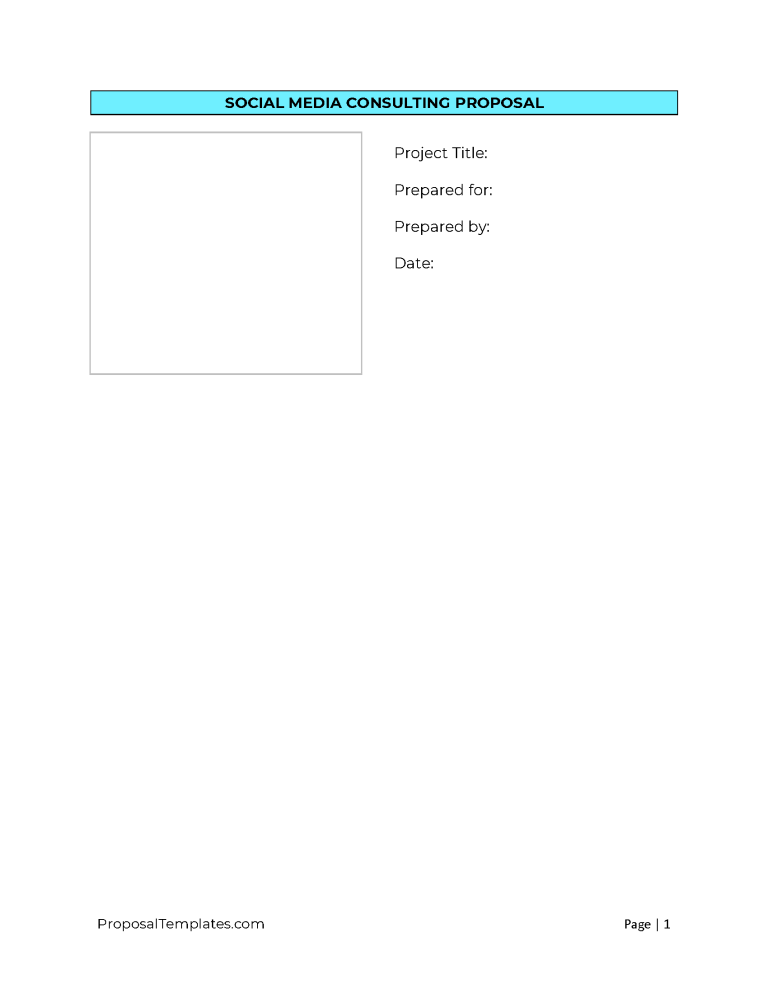Social media consulting proposals are developed by consulting firms to approach potential clients, especially as a response to a client’s request for proposal (RFP). This document must promote the consulting team’s expertise while also directly answering the client’s needs.
Types Of Social Media Consulting Proposals (11)
- Advertising – A consultant’s petition to enhance a company’s advertising strategies on social media platforms such as Facebook.
- Analytics – A consultant’s proposal to elevate a company’s social media performance using their analysis and key metrics data.
- Audit Proposal – Consultants send this proposal whenever seeking a contract to analyze as well as enhance a company’s social media efforts.
- Community Engagement – A proposal used by consultants seeking to improve a company’s social media engagement, such as through user-generated content.
- Campaign – Proposals featuring a consultant’s budgeted strategies for campaigns on social media platforms while presenting KPIs and goals.
- Content Calendar – This proposal is sent whenever a consultant seeks projects calling for scheduling and posting engaging content to promote a company via social media.
- Crisis Management – Proposals containing strategies to aid a company’s damaged social media reputation, thus containing mitigation strategies.
- Cross-platform Integration Proposal – A proposal presenting a consultant’s strategy to significantly elevate a company’s social media presence across several platforms.
- Influencer Marketing – A proposal highlighting a consultant’s content creation and strategy suggestions to improve social media influencer campaigns significantly.
- Management – A proposal where the consultant will improve a company’s social media management strategies (i.e., content, schedules).
- Training – This type of proposal offers training specifically to bolster the social media skills of a company’s employees or representatives.
1. Cover Page
Title and date this document accordingly using an attractive cover page. Combine basic information defining the proposal with this title information, such as the author and recipient.
- Proposal Title, Date
- Social Media Consulting Firm Name
- Potential Client Name
- Graphic Design, Social Media Information
- Portfolio Site, (Optional) Table Of Content
2. Introduction To Social Media Consulting Proposal
Greet the social medial consulting client in a professional but encouraging manner. Show the consulting firm’s strengths while expressing a desire to work with the prospective consulting client.
- Social Media Strategy, Digital Marketing Solutions
- Online Presence Enhancement, Audience Engagement
- Brand Visibility, Content Optimization
- Targeted Marketing Campaigns, ROI Improvement
- Customer Relationship Management (CRM)
3. Client Overview
Produce a summary of the client’s history, objectives, and industry standing as well as its social media presence. If helpful, then briefly present a SWOT analysis (strengths, weaknesses, opportunities, threats) of the client and their competitors.
- Business Objectives, Target Audience Analysis
- Brand Positioning, Online Reputation Management
- Conversion Metrics, Key Performance Indicators (KPIs)
- Content Effectiveness, Customer Relationship Management (CRM)
- SWOT Analysis (Strength, Weakness, Opportunity, Threat)
4. Social Media Objectives And Goals
List the objectives of the social media consultation, making sure they align with the client and consulting firm’s overall goals. To clarify, consider it imperative that this proposal’s business objectives are aligned accordingly.
- Social Media Visibility, Brand Awareness Enhancement
- Audience Reach Expansion, Community Building
- Engagement Metrics Improvement, Lead Generation
- Social Media Funnels, Content Marketing Strategy
- Social Media Campaign Effectiveness, Customer Loyalty Building
5. Current Social Media Analysis
Comparatively, assess the current presence of the client on social media with that of their competitors. Keep the client’s current standing as well as their potential and projected improvements in focus.
- Social Media Metrics, Performance Analytics
- Engagement Metrics, Click-Through Rate (CTR)
- Reach And Impressions, User Interaction Analysis
- Content Effectiveness, Platform-Specific Analytics
- Hashtag Performance, Competitor Benchmarking
6. Target Audience Analysis
Identify the behaviors, demographics, and preferences of the client’s target audience since this will directly interest the client. For example, present the target audience’s income power and geographic location.
- Demographic Segmentation, Customer Personas
- User Segmentation, Consumer Preferences, Microtargeting
- Psychographic Profiles, Buyer Behavior Analysis
- Audience Insights, Social Media Demographics, Hashtags
- User Behavior Analysis, Competitor Audience Analysis
7. Proposed Social Media Strategy
Produce a significantly detailed strategy to improve the client’s social media presence and visibility. Fully describe the ideal platforms and posting schedules as well as the content.
- Content Calendar Planning, Content Mix Optimization
- Engagement Strategies, Visual Content Strategy
- User-Generated Content Plans, Trend Utilization
- Cross-Platform Integration, Hashtag Campaigns
- Video Content Production, Live Streaming Initiatives
8. Content Calendar
Include a sample content calendar in order to support the proposed strategy. Specifically mention individual campaigns, key themes, and social media event promotions.
- Content Scheduling, Strategic Content Distribution
- Editorial Calendar Planning, Timely Content Updates
- Consistent Posting Frequency, Seasonal Content Planning
- Keyword-driven Content Strategy, Trending Topics
- Evergreen Content Planning, User-Generated Content Integration
9. Paid Advertising Strategy
Present the schematics of the venue in the appendix here, then describe all its amenities and safety measures. Go into detail on how it serves the event (i.e., field dimensions).
- Paid Social Media Campaigns, Targeted Advertising Solutions
- Budget Allocation Strategy, Ad Campaign Optimization, ROI Focus
- Ad Copy Testing, Keyword Targeting, Ad Placement Strategy
- Cost-Per-Click (CPC) Optimization, Cost-Per-Impression (CPI) Management
- Click-Through Rate (CTR) Improvement, Ad Performance Analytics
10. Community Engagement Plan
Present the engagement strategy or plan for the community accordingly. That is, highlight the feedback process and planned online interactions with the client’s target community.
- Community Building Strategies, Interactive Content Plans
- User Participation Tactics, Engagement Initiatives
- Online Community Development, Social Listening
- Customer Relationship Building, Community Challenges
- Feedback, Survey Integration, Live Chat, Messaging Platforms
11. Key Performance Indicators (KPIs)
Explain how the metrics of the social media strategy will be measured, such as by defining its KPIs (key performance indicators). As an example, explicitly lay out the tracking and assessment tools to gauge social media performance.
- Social Media Metrics, KPI Monitoring, Performance Tracking
- Social Media Analytics, CTR, Customer Acquisition Cost (CAC)
- Engagement Metrics, Brand Mentions Tracking
- Lead Generation Metrics, ROI, Social Media Traffic Sources
- Audience Growth Rate, Customer Lifetime Value (CLV)
12. Reporting And Analytics
It is important to inform the social media client of the reporting process for this campaign or project. To clarify, layout the performance analytics reporting frequency and how it impacts the social media strategy.
- Social Media Reporting, CAC Metrics, ROI Analysis
- Data Analysis Strategies, Custom Analytics Dashboards
- Metrics-driven Reporting, KPIs, Real-time Analytics
- Competitor Benchmarking, Conversion Tracking
- Sentiment Analysis, CTR, User Behavior Analytics
13. Budget And Resources
Lay out the funding, resources, and overall budget of the proposed social media strategy. In addition to an itemized and total budget, point out the dependencies and assumptions made.
- Social Media Budgeting, Budget Optimization
- Cost-effective Strategies, Cost-Per-Click (CPC) Management
- Resource Allocation Plan, ROI-focused Budgeting
- Cost-Per-Impression (CPM) Strategies, Ad Spend Efficiency
- Competitive Pricing Strategies, Cost-Effective Advertising Solutions
14. Social Media Initiative Timeline
Deliver the social media strategy’s schedule beginning with the acceptance of this proposal. For example, name the dates for important deliverables, milestones, and objectives.
- Project Schedule, Milestone Achievements
- Timeline Planning, Phase-Wise Implementation
- Strategic Timelines, Ad Campaign Scheduling
- Content Calendar Deadlines, Launch Dates
- Campaign Rollout Schedule, Reporting Frequency
15. Social Media Consulting Team
Name the members of the social media consulting team also present each one’s role. Speak about their individual and team achievements in the industry while promoting their track record.
- Social Media Specialists, Content Creators, Digital Marketing Experts
- Graphic Designers, Community Managers, Data Analysts
- Influencer Marketing Specialists, Copywriters, SEO Professionals
- Brand Strategists, Paid Advertising Experts, Event Promotion Specialists
- Video Content Producers, Campaign Strategists, User Engagement Specialists
16. Client Testimonials
If testimonials and other endorsements are available from previous clients, then present them. Additionally, discuss any case studies showing the consulting team’s expertise and problem-solving successes.
- Social Media Success Stories, Positive Outcomes
- Client Satisfaction Stories, Results-Driven Approaches
- Client Testimonials, Social Media Case Studies, ROI Success
- Achievement Highlights, Impactful Campaigns
- Effective Engagement Strategies, Increased Brand Visibility
17. Terms And Conditions
Definitely outline the contracts, provisions, and payment terms, as well as the duration of the proposed work. This discussion should also include the rules for termination once a contract is signed.
- Service Agreement Terms, Legal Terms, Terms Of Engagement
- Consulting Services Conditions, Client Responsibilities
- Consultant Obligations, Payment Terms And Conditions
- Intellectual Property Rights, Confidentiality Agreement
- Project Scope, Limitations, Termination Clause, Force Majeure Clause
18. Next Steps
Instruct the client on how to proceed from this proposal either with inquiries or, especially, with a commitment. The final words should be positive, inviting, and present ideal methods of contact accordingly.
- Client Instructions, Encouragement, Call To Action
- Contact Information, Accessibility Options
- Implementation Plan, Project Kick-Process
- Actionable Steps, Execution Strategies
- Project Launch Details, Communication Protocols
19. Appendices
Every document that supports this proposal, as well as those that promote the firm, should be included in a predetermined area. Attach all such items to a single section to aid the client’s understanding of its content.
- Contracts, Agreements, Disclosures
- Financial Projections, Research Data
- Testimonials, References, Past Clients Information
- Visuals, Case Studies, Technical Information
- Consulting Service Packages, Contact Information

